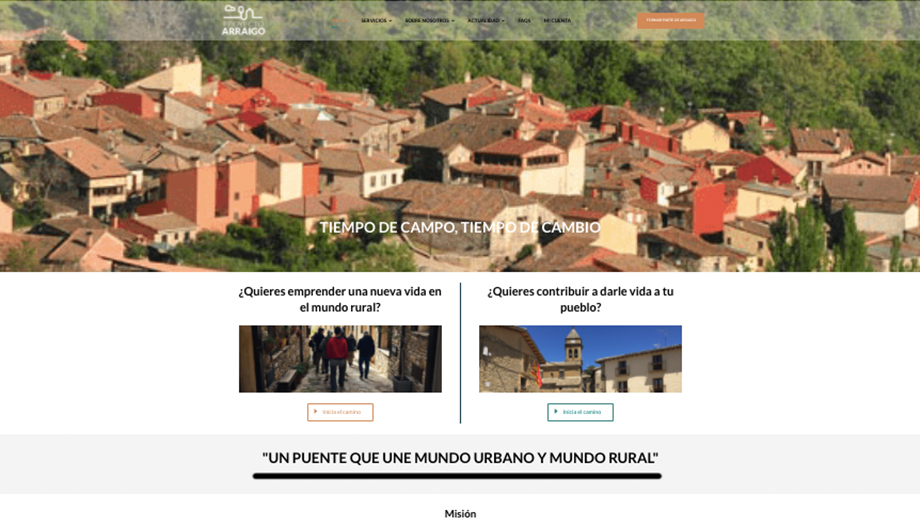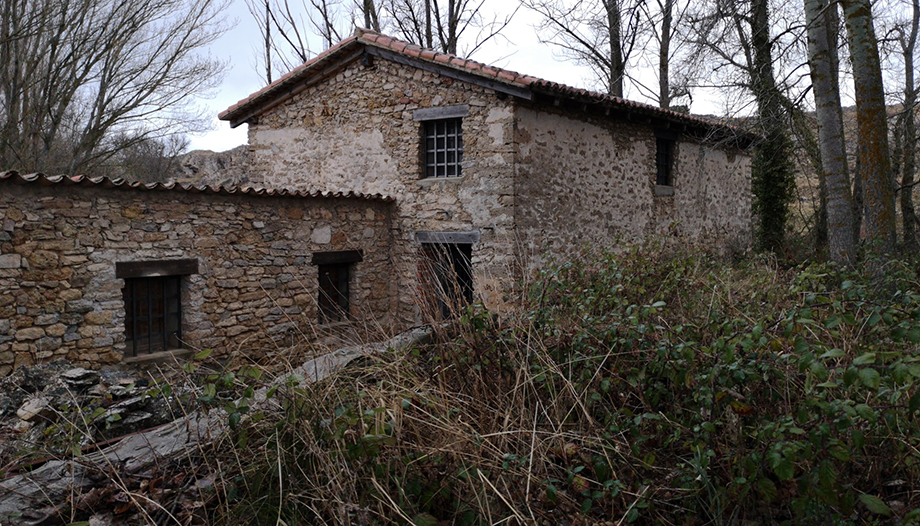The objective was to make visible the problem of the emptied Spain, mistreated by depopulation and abandonment. And in the middle of Holy Week, numerous churches in Aragonese, Extremaduran and Castilian towns rang their bells at the end of March to make visible the "emptied Spain", reported this portal.
However, the atmosphere has changed in these weeks around May 15, the feast of St. Isidore, patron saint of the rural world and farmers, and not only in Madrid. Indicators showed this since the end of last year, and it was already noticeable in the first months of this year.
Villages have begun to grow, little by little, largely due to the Covid-19 pandemic, teleworking and the need for ventilated and open spaces, according to agents in the sector. Thus, it could be said that thousands of so-called "urbanites", city dwellers, have begun their particular exodus to the towns, for example, in Madrid and Castile, and also in other places, for example in Álava.
Transforming the virus into life
"Our villages, more alive than ever after the pandemic". Thus began the public notice Juan Carlos Elizalde, president of the Episcopal Subcommittee on Migration of the Spanish Episcopal Conference (CEE). The Caritas delegate is Javier Querejazu, and the director, Maite Sebal.
The issuers of the note have been "the entities that work in rural Alava ACOA-AKE (Association of Councils of Alava), Caritas, Rural Christians of Alava and UAGA (Union Agroganadera of Alava)", who emphasize that "despite everything, this crisis has taught us to value our life". And they point out four aspects:
"Still suffering the consequences of Covid-19", "we think that although the virus has had serious consequences, we have learned from this situation and we want to transform the virus into life", because:
"- We are aware of the need to value all that we have on a personal and collective level, to savor the advantages of living in a rural environment, to continue to put neighborly relationships into practice.
- We must take the initiative and focus on what is important: creating networks, moving from the individual to the power of the collective.
- We have demonstrated our capabilities and our contribution to society. As neighbors, we have accompanied in the mourning for all the losses of this year.
- We remain committed to rural life, to agriculture and livestock farming as a way of life, because food production is essential for our society. We have faced the challenges and we continue to look forward with optimism".
Creativity in rural areas
This communiqué, and other similar ones in which various dioceses have intervened, can be framed in the context of the speech of Cardinal Juan José Omella, archbishop of Barcelona and president of the EEC, at the opening of the Plenary Assembly of the Spanish bishops in April:
"In Spain there is a growing and serious problem called 'social inequality'. This is a challenge that we have to address to ensure the dignity of all and the necessary social justice that is always a guarantee of social peace," said Cardinal Omella.
Shortly thereafter, after referring to the fact that "the Pope urges us to promote a integral ecology at the service of the common good and of the people"He stressed the need for "creativity" in this area of integral ecology and "the promotion of a more humane economy", which "could help to address rural depopulation, the aging of the population, dispersion and emigration to the city that affects rural areas".
He went on to talk about the ecclesial sphere and the countryside: "In Spain almost half of the parishes are rural, which demonstrates the historical presence of the Church throughout the Spanish geography and the rich cultural heritage it has generated. However, paradoxically, it is currently a major challenge to keep these parishes alive and active, and to organize pastoral care".
Increased demand
In fact, the creativity to which the cardinal referred is shown in initiatives under study in various Spanish dioceses, and also among entrepreneurs and the business sector.
A few weeks ago, two reporters from RTVE's Comando Actualidad talked about villages that come back to life. Silvia Pérez and Silvia Sánchez referred to the formula of the three A's: anguish, overwhelm and pandemic boredom, thus increasing the interest in living in the countryside by up to 30 percent during the health crisis". They even noted that in addition to seeing their population grow, they had experienced the miracle of reopening their school.
Around the same time, El Mundo reported that "Covid triggers the exodus to the towns: more than 70 Madrid municipalities have increased their population by an average of one hundred inhabitants in 2020. Telemadrid, for its part, broadcasted a report saying that "living in the towns of Madrid is on the rise", and "the increase in demand causes a rise in rental prices of up to 30 percent in some towns in Madrid, a change in search of more tranquility and quality of life after the long confinement of the spring of 2020".
The Madrid regional channel provided other data. "69 of the 78 municipalities of the Community with less than 2,500 inhabitants have seen their population increase by around 10 or 15 %. But they are not the only ones. Many municipalities with populations of up to 10,000 inhabitants, or even more, are also experiencing this growth. Cercedilla, for example, has had 500 more registered residents in three months".
Revitalization
On the other hand, the Christian rural movements have exposed these days on the Cope channel several advantages and disadvantages of living in the countryside during the pandemic.
"The flight of many families to the countryside as a refuge from the Covid virus has revitalized many villages that were virtually uninhabited. In addition, the restrictions have been somewhat more flexible, thanks to the large open spaces that the countryside makes possible," Aleluya points out.
To celebrate April 15, the Christian Rural Movement and the Movimiento de Jóvenes Cristianos (Young Christian Movement) have released some videos in which they explain the advantages and problems of living in small towns. Among the positive aspects, rural inhabitants highlight "a better quality of life compared to city life" and "more flexible restrictions"; and among the disadvantages, the cuts in certain essential services, such as medical consultations by telephone, and the arrival of people "who have no rural soul and perhaps do not live the values of coexistence, closeness, valuing the small, the history and rural customs, etc.
Importance of restocking
The question now may be: is this exodus to the villages easy, to take root in the rural environment after years in the city? Omnes has contacted Enrique Martinez Pomar, CEO of Arraigo Project "a bridge linking the urban and rural worlds", which it defines as "a private, sustainable and scalable social innovation project, a pioneer in population services for sustainable rural repopulation".
The territory in which Proyecto Arraigo works with its advisory services includes four Autonomous Communities (Castilla y León, Aragón, C. Madrid and Andalusia), six provinces and numerous towns. For example, they are in the Sierra Norte de Madrid, the region of Cinco Villas in Zaragoza; three towns in Palencia (Dueñas, Paredes de Nava and Cervera de Pisuerga), which will now be extended to towns with less than 500 inhabitants; the municipality of Belorado in Burgos; and 45 municipalities in Soria, where their project began.

"The art of repopulation requires the involvement of many agents from within and outside the municipality," explains Enrique Martínez Pomar. "The degree of involvement of the municipalities, the quality and commitment of the technical professionals and the resources available for the development of the project are the factors that determine, to a large extent, the pace of the repopulation process," he adds.
Because "our mission is to accompany and advise, on the one hand, people and entrepreneurs who are looking for that change, and, on the other hand, municipalities and other rural entities in their development strategy, attracting new settlers and supporting the welfare of their town or region. The result of this union is the creation of new opportunities and the sustainable development of the villages", says the CEO of Proyecto Arraigo, a company that already has in its interconnected databases "more than 4,000 records of people interested in a change of life in the rural world".
Rooting urbanites in the rural world
Martínez Pomar stresses that "rooting a family in the rural world is the tip of the iceberg; there is a lot of work to be done to achieve this. "The rooting of urbanites in the rural world and giving life to the villages", is how the manager summarizes his task in rural areas, a world in which the Church also operates. The manager of Arraigo Project pointed out that last year there was a meeting in the Sierra Norte of Madrid with Cardinal Archbishop Carlos Osoro, who was interested in the problem of depopulation and the aging of villages in the mountains. A meeting in which also participated the vicar of zone I, Juan Carlos Vera, and Alejandro, a priest who attends several villages, such as Montejo, Horcajuelo, Serrada and Paredes, among others.
Some priests who serve rural parishes in many dioceses have reported on their experiences in Omnes. On the 15th of last month, the SIC agency published an article entitled Priesthood in the rural worldwith the testimony of Francisco Buitrago (Paco), a priest who is responsible for six municipalities of Alba de Tormes in the diocese of Salamanca.
Francisco Buitrago values very much being with the people, "the presence, apart from bringing them the Eucharist and the Word of God at Sunday Mass, and also during the week, I am usually present in the afternoons, once a week in each village where we celebrate the Eucharist". The priest regretted that with the pandemic he could not be there more often, "and I can do less, but I visit the sick or the elderly".







